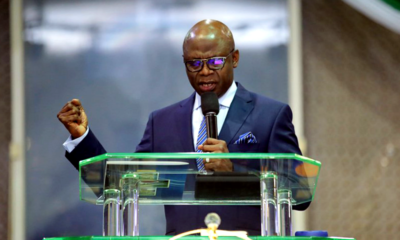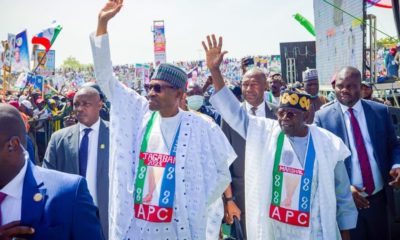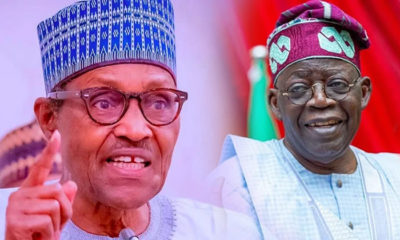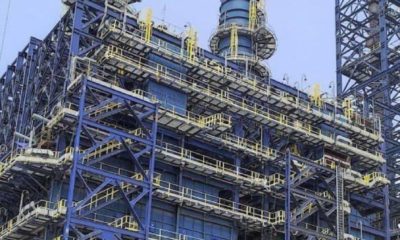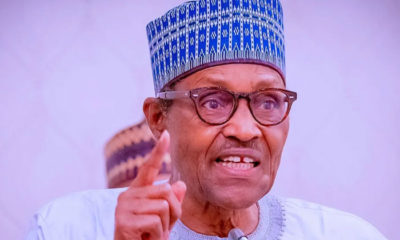NEWS
Naira Redesign Policy: Why Supreme Court Might Dash Hopes
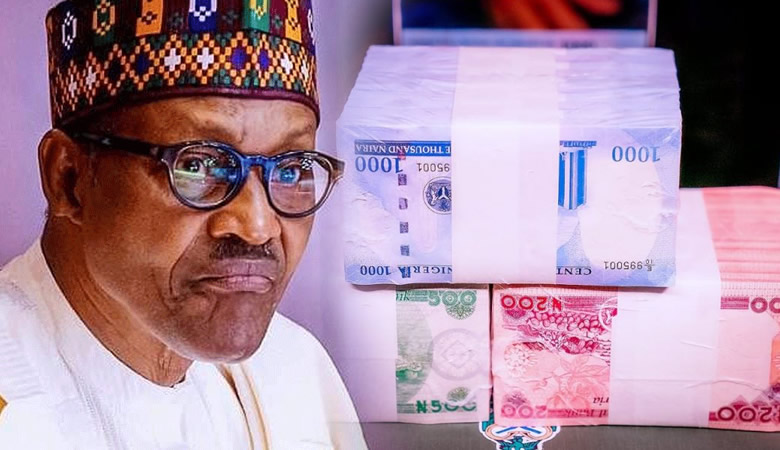
Those celebrating victory over the Supreme Court’s ruling, adjourning the enforcement of the stripping of the redesigned Naira notes of legal tender status, should think again.
Those who know have come out to explain that the apex court cannot be a primary court and those who acted the drama would have done so to sooth the nerves of cronies.
A legal luminary, Mike Ozekhome, has explained that the order of the Supreme Court, restraining the Federal Government, the Central Bank of Nigeria (CBN) and all other actors in the theatre of naira redesign, was made to preserve the subject-matter for proper legal consideration and dispensation of justice.
He offered the explanation in a Channels Television programme, monitored by Biztellers, in Lagos on Wednesday.
According to him, the apex court gave the judgement so as to prevent the subject matter of the suit from being truncated. The Supreme Court merely created a window for the hearing of the matter for proper judicial interpretation and intervention.
Ozekhome said, “The Supreme Court has not decided the matter. All it has done is to fall back to a decision like Kotoye vs CBN, that in matters of extreme urgency, you can grant an interim order, even if it be an ex-parte, to prevent the subject matter of the suit being truncated.
“If, for example, the Supreme Court, did not make that order, and the only order existing is that of the High Court, it means that the CBN, by 10th of this month, will stop the use of all old notes.
“But what the Supreme Court has said is, ‘Just wait, let us listen to you people,’ not that it has decided that Zamfara, Kogi and Kaduna states have any valid case that is actionable because the action is already being challenged with a preliminary objection.
“It is another way of saying, ‘Let us first drive away the fox before we blame the fowl for wandering too far into the forest’.”
Elucidating on why this had to be the case, he explained that other lower courts could not interfere when decisions were being debated at the apex court.
“Notwithstanding the fact that a high court or Federal High Court had granted an order telling the CBN, ‘You can stop this naira swap policy on the 10th of February as you have decided to do’, the Supreme Court today said, ‘Hello? Don’t do that! Allow it to continue. Come back on the 15th of February and let us hear you people’,” he added.
NEWS
N1.7trn Loan: Atiku Blames NASS For Worsening Nigeria’s Debt Burden
Former Vice President, Atiku Abubakar has criticized the federal government’s plan to secure an additional N1.7 trillion loan through Eurobonds to cover a shortfall in the 2024 budget, describing the borrowing as unsustainable and harmful to Nigeria’s economy.
In a statement shared on Thursday via his X (formerly Twitter) handle, Atiku accused the Bola Tinubu-led administration of burdening Nigerians with debt while failing to provide clear answers about the country’s fiscal challenges.
READ ALSO: CSR: Dangote Cement Fuels Education With Support Projects At Lagos Schools
He also faulted the National Assembly for enabling what he called a “voracious appetite” for loans.
The former Peoples Democratic Party (PDP) presidential candidate expressed alarm over a recent World Bank report ranking Nigeria as the third most indebted country to the International Development Association (IDA), calling the development troubling.
“The recent report released by the World Bank, showing Nigeria as the third most indebted country to the International Development Association (IDA), is very concerning,” Atiku stated.
He raised further concerns about the government’s decision to benchmark the proposed loan at an exchange rate of 1 USD to N800, despite the Central Bank of Nigeria’s official rate being over N1,600.
“What makes this particular loan proposal even more concerning is that it is benchmarked at the exchange rate of 1 USD to N800, whereas the current exchange rate from the Central Bank of Nigeria stands at over N1,600 to 1 USD,” he said.
Atiku questioned the need for additional borrowing, given the government’s earlier claims of record-high revenue collection.
“In July this year, Tinubu boasted that the FIRS and Customs under his watch had collected all-time high revenues to finance the budget. Why are they still borrowing?” he said
He accused the government of a lack of transparency, describing the borrowing spree as detrimental to Nigerians already struggling under economic hardship.
“There is something that they are not telling Nigerians, even as they are being crushed by a combination of their failed trial-and-error policies and loan rackets.”
Atiku also referenced a report by BudgIT, a budget monitoring group, which criticized the 2024 budget for its inefficiencies.
He alleged that corruption, rather than infrastructure or development needs, was driving the government’s borrowing decisions.
“These loans are powered by corruption and not for infrastructure and development needs. This voracious appetite for humongous loans is deeply concerning,” he said.
Reflecting on Nigeria’s financial history, Atiku lamented the return to significant foreign indebtedness just years after former President Olusegun Obasanjo’s administration cleared the country’s debt.
“It is agonizing to see that just a few years after the Obasanjo administration took us out of foreign indebtedness, we are today back at the top spot in the same conundrum,” he stated.
He called for a more cautious approach to borrowing, urging the government to prioritize fiscal responsibility and transparency to avoid worsening Nigeria’s economic challenges.
International News
ICC Issues Arrest Warrants For Israeli Prime Minister Netanyahu, Others
The International Criminal Court (ICC) has taken a historic step, issuing arrest warrants for Israeli Prime Minister Benjamin Netanyahu and former Defense Minister Yoav Gallant.
The charges include crimes against humanity and war crimes allegedly committed during Israel’s recent assault on Gaza.
In a detailed statement, the ICC accused the Israeli leaders of “intentionally and knowingly depriving the civilian population in Gaza of objects indispensable to their survival, including food, water, and medicine and medical supplies, as well as fuel and electricity.”
READ MORE: Osun Govt Decries Attempted Murder Of Park Mgt Chairman By Police
The ICC’s move marks a significant escalation in international scrutiny of the Israeli-Palestinian conflict. Netanyahu and Gallant are alleged to have orchestrated policies that caused severe harm to the civilian population in Gaza, leading to widespread condemnation from human rights organizations.
Alongside the charges against Israeli officials, the ICC also issued an arrest warrant for Hamas military commander Mohammed Deif. Deif has long been a central figure in Hamas’s military operations. Israel’s military claims to have killed him in a July airstrike, although this has not been independently verified.
The warrants highlight growing calls for accountability amid the ongoing conflict in the region. The ICC’s actions are likely to provoke heated debate and may complicate diplomatic efforts aimed at resolving the crisis.
With the warrants issued, global attention now turns to how the international community will respond and whether any practical steps will be taken to enforce them.
NEWS
Edo State Governor Sets Up Committee To Recover Missing Gov’t Vehicles
Governor Monday Okpebholo of Edo State has inaugurated a 12-member committee tasked with recovering government vehicles reportedly in private hands.
The committee, led by Kelly Okungbowa, has been given a two-week mandate to retrieve the vehicles and ensure their return to the state government.
READ ALSO: Finnish Police Arrest Simon Ekpa Over Terror-Related Allegations
Speaking during the inauguration ceremony in Benin City, Governor Okpebholo emphasized the importance of accountability in the management of public resources.
He urged the committee to carry out its assignment thoroughly and within the bounds of the law.
In his response, Okungbowa expressed gratitude to the governor for entrusting the team with the assignment, vowing to deliver results within the stipulated timeframe.
“A lot of vehicles used by the past administration are missing, as those in custody of the vehicles have refused to return them,” Okungbowa said.
“The governor deemed it fit to inaugurate us today with a mandate to recover all government vehicles in private hands.”
The committee, which includes representatives from Edo’s three senatorial districts, is set to investigate and recover the vehicles based on credible intelligence already at their disposal.
“We already have vital information regarding some persons still holding government vehicles,” Okungbowa stated. “We will do the job according to the law, and both the government and the people will be satisfied with the outcome.”
He also called on members of the public to assist the committee by providing information about any government vehicles that may still be in private possession.
“We want to appeal to members of the public who might be aware of anyone still keeping government vehicles in their houses to please inform us to enable the committee to recover such for the Edo State Government,” Okungbowa said.
The committee’s vice chairman, Rt. Hon. Victor Edoror, a former Speaker of the Edo State House of Assembly, will work alongside other members to ensure the success of the initiative. The public can reach the committee at 08110165121.

